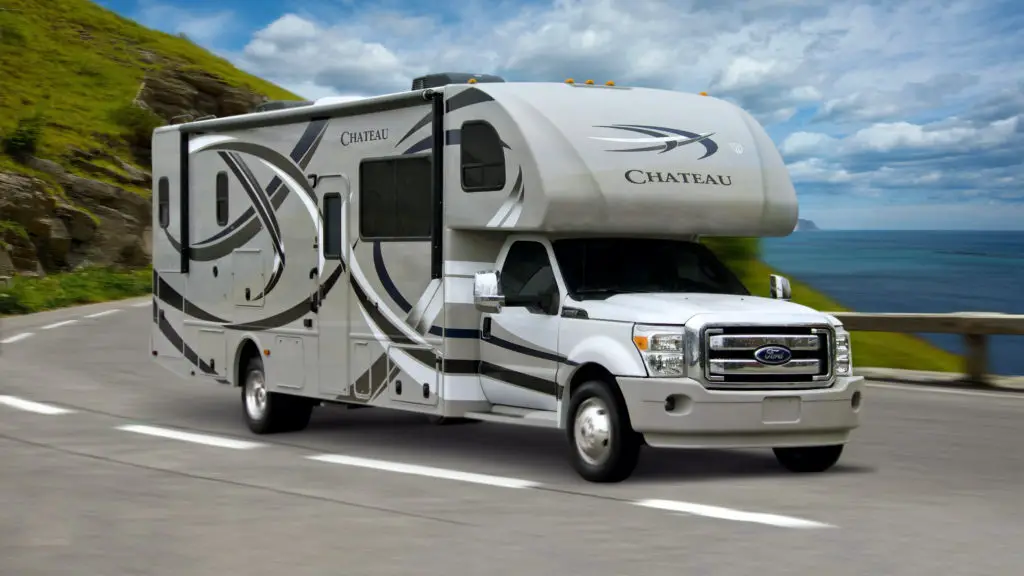How much doe’s the average RV weigh?
The average Driveable RV weighs around 10,000 pounds (dry weight) give or take. Dry weight is the weight of the RV when tanks are not filled and it has no gear in it. Therefore, When you start loading supplies, water, and yourself it will add around another 12- 1,500 pounds.
Towable RVs range between 1,000 (for a small pop-up camper) to 16,000 pounds (for a large fifth wheel) with an average of around 7,000 lbs.
This is an average weight for all RVs in general.
Can I pull that with my 1/2-ton Truck?
I hear this question a lot and decided to do a little research to find out. So, what is the average RV weight?
So, I have really killed two birds with one stone since I am in search of an RV myself.
From the setups I see on the roadways today, people are pulling much more than their trucks can safely handle. It is really kind of scary when one of these rigs flies by you on the highway at 70 MPH.
Even many motorhomes are stuffed to the gills with supplies, water tanks full, pulling a TOAD, and a rack on the back, filled with adventure items. Most motorhomes are not rated to have tons of extras dumped onto them and shot like a rocket down the road.
Here is a great article on RV insurance companies

How much does a Recreational Vehicle weigh?
Typical RV weights
| MODEL | WEIGHT |
| CLASS A | 13-30,000lbs. |
| CLASS C | 10-12,000lbs. |
| CLASS C (SUPER C) | 20-72,000lbs. |
| CLASS B | 6-11,000lbs. |
| FIFTH WHEEL | 5-15,000lbs, |
| TRAVEL TRAILER | 1-9,000lbs. |
| TEARDROP | 500-3,500LBS. |
| POP UP | 600-4,500LBS. |
So, I’m guessing you are online searching for RV weights to find out how much weight your vehicle can tow.
You hear terms like dry weight, GVW, CVWR, GAWR, and cargo-carrying capacity, in foreign languages for most people.
So, hopefully, we can shed a little light and help you get into your dream RV. One that fits you, and your vehicle can handle it safely.
So, What do all these numbers even mean?
What is Gross Vehicle Weight (GVW)?
The Gross Vehicle Weight is the actual weight of the fully-loaded RV including all cargo, fluids, passengers, and optional equipment. So, this is pretty much everything!
What is my Gross Vehicle Weight (GVWR)?
The Gross Vehicle Weight Rating is the heaviest weight determined by the manufacturer for the safe operation of your RV.
How do I know my Dry Weight/Shipped Weight?
Dry Weight/Shipped Weight – The weight of the RV as shipped from the manufacturer without any passengers, cargo, liquids, additional accessories, or dealer-installed options.
What is Tongue or Hitch Weight?
The weight/pressure applied from the trailer tongue/coupler to the conventional/bumper hitch on your vehicle.
What is Pin Weight?
This is often referred to as the weight/pressure applied from the fifth wheel kingpin to the bed hitch in the truck.
What is Cargo Carrying Capacity?
(Cargo Carrying Capacity) is the maximum weight of everything you add to the RV, including all belongings. This includes full water tanks, fuel, propane, supplies, and yes, yourself & family,
How much does a trailer weigh?

Typical RV types to choose from
Class A RVs
Class A RVs are the largest and most luxurious motorized style of RV built. Built on a commercial bus or truck chassis with either a gas or diesel engine. They can range from 26′ to 45′ long, with most landing around 33′.
Typically, class A RVs drive and look more like a bus. Class A RVs are sometimes restricted in national and other parks due to roads being difficult to navigate. So, keep in mind where you want to go when selecting a class A RV.
Class B RVs
A Class B RV is an RV built on a van chassis and the smallest of all drivable RVs or motorhomes, coming in both gas and diesel engines. They can vary in length but typically are small enough to fit in a regular parking spot. They have minimal interior room to accommodate all the amenities of a typical motorhome.
These camper van conversions often have lofted fiberglass roofs to allow passengers to stand up inside. There are typically fewer restrictions for class B RVs since they are not much larger than a work van.
Class C RVs
Class C RVs are somewhere between Class A and Class B. They are often built on a truck or van chassis that is specifically designed for a motorhome. They have an attached cab and most have an overhang that extends over the cab. This area is usually used as sleeping quarters but may also be used for storage.
The driver and passenger doors are more accessible, and allow getting in and out much easier. Perfect for a quick snapshot of an awesome view or grabbing something out of the under storage.
Fifth Wheel
Fifth wheels often come with the same amenities as a motorhome or travel trailer but are constructed with a raised forward section that provides a more spacious bi-level floor plan. These models are designed to be towed by a pickup truck equipped with a device known as a fifth-wheel hitch.
Travel Trailer
Travel trailers, while similar to camping trailers in many ways, are more closely related to RVs or mobile homes. Some would call travel trailers a general term for any mobile living trailer. However, the most common definition is a lightweight RV that a conventional ball hitch can tow.
Pop up Camper
A pop-up camper is an RV trailer towed by a vehicle. While in transit or in storage, the camper is folded into a condensed package. The only thing exposed is the exterior coverings, allowing for easy transport.
We have covered RV weights, common terminology, and types of RVs you may be in the market for so far. It is time we dig in and find out if your vehicle can tow that trailer.
Can my truck pull my trailer?
How do I figure out my truck’s tow capacity?
You can find your truck’s towing capacity in the owner’s manual or calculate it on your own. To find your truck’s towing capacity, subtract your truck’s curb weight from its Gross Combined Vehicle Weight Rating (GCVWR). The GCVWR is the maximum weight of your loaded truck and the weight of its attached trailer.
Most ¾ ton pickups can tow 12,000-15,000 lbs. These bigger trucks give you more options for bigger trailers. The gas models can generally tow between 9,500 and 15,000 pounds. Diesel models tow up to 14,500 18,000 pounds.
Travel trailers and pull behind campers

How much tongue weight can my truck handle?
Tongue load should be 10 to 15 percent of the trailer’s total weight—if you’re towing 5,000 pounds, then the tongue weight would be 500 to 750 pounds.
How do you calculate tongue weight?
To weigh RV tongue weight, place the tongue of the trailer on a tongue weight scale. The TW can also be found by weighing your tow vehicle on a vehicle scale by itself. Then compare it to the vehicle weight when the trailer is coupled.
What happens if tongue weight is not distributed correctly?
Too little tongue weight can cause trailer sway and too much tongue weight can cause the tow vehicle to perform poorly. You may have difficulty steering, gaining traction, or braking with too much weight on the rear of the vehicle.
What is a weight-distribution hitch and do I need one?
A weight distribution hitch is a system designed to create a level, stable ride when you tow a trailer. Basically, a weight-distribution hitch will help keep your towing setup level and make sure the weight of your trailer doesn’t cause undue stress on your vehicle.
This even distribution of weight results in a smooth, level ride, as well as the ability to tow at the maximum capacity of your hitch. Basically for safety, comfort, and peace of mind.
How much does a trailer weigh?

Fifth Wheels
The max is 18,000 lbs for fifth-wheel towing. Many people, including many truck dealers, stop here and think this is what this truck can tow. However, this is only half of the picture. Of equal importance is cargo capacity.

How to calculate how much of a fifth wheel you can tow safely
- Calculate Pin Weight. This is the weight of the trailer that sits on the axles of the truck when you connect a trailer to the truck.
Take 20% of the Gross Vehicle Weight Rating of the trailer = Pin Weight
2. Calculate your Payload. This is what your truck can actually carry.
Take the GVWR of the truck minus (-) the Curb weight (empty truck) = Your Truck’s Payload.
3. Now add them together. People, pets, truck fuel, cargo of the truck, and Loaded pin weight mentioned above and total it.
4. Calculating Gross Combination Weight.
Take your Truck Curb Weight + People + Pets + Truck Fuel+ Truck Cargo + GVWR of Trailer = “Magic Number”
Now compare the “Magic Number” to your Gross Combined Vehicle Weight Rating (GCWR).
Ideally, you should be about 20% under the GCWR number.
Important – Never should your weight be over the GVWR. Driving overweight can affect how well your RV drives and your insurance coverage.
What factors affect towing capacity?
Towing capacity is how much the truck can pull, while payload capacity is how much it can carry. These can depend on such factors as the truck’s configuration, its chassis, its engine and transmission, its rear axle ratio, and its weight, and there can be considerable range over a truck’s full lineup.
Do your research if in the market for a new towing vehicle or know your vehicle if you currently own one.
Now for the most asked question in the RV world, Can my 1/2 ton tow this?
Today 1/2 ton models are rated to tow 6,500 to 10,000lbs. Remember just because it is rated to tow that by the manufacturer doesn’t mean it is safe to tow that much.
If you are even close, I would advise you to step up to a 3/4 ton and for a larger RV, a truck with dually’s.
What can happen if I go over my towing capacity?
If your trailer’s weight (including all cargo and passengers) exceeds its maximum capacity, driving with the trailer attached is a huge risk. Overweight trailers put more pressure on the wheels and axles than they are designed to handle, which can cause tire blowouts or trailer sway.
Tips
- Know how much your vehicle can tow
- Check the weight of your trailer/camper
- Figure your carrying capacity and do not go over or even close
- Remember everything you bring along (including yourself) adds up quickly
- Overloading your tow vehicle or trailer can be very dangerous
- If you are purchasing new, don’t buy more than the tow vehicle can handle safely (dangerous for you and can tear up your tow vehicle)
- Go big or go home has no place here
Final Thoughts
Get your RV weighed if you have any doubts about it. Most commercial weigh stations in your area will accommodate you and the weight of your trailer and then your truck & trailer together. It’s better to know your weight rather than guessing and assuming you’re under the GVWR. Don’t put yourself in an unsafe situation or cause unnecessary breakdowns. As we all know RV breaks down enough without extra help from us. So, next time you ask, how much does a trailer weigh? You will know! Get out there and be safe and have fun!
How much does a trailer weigh?




